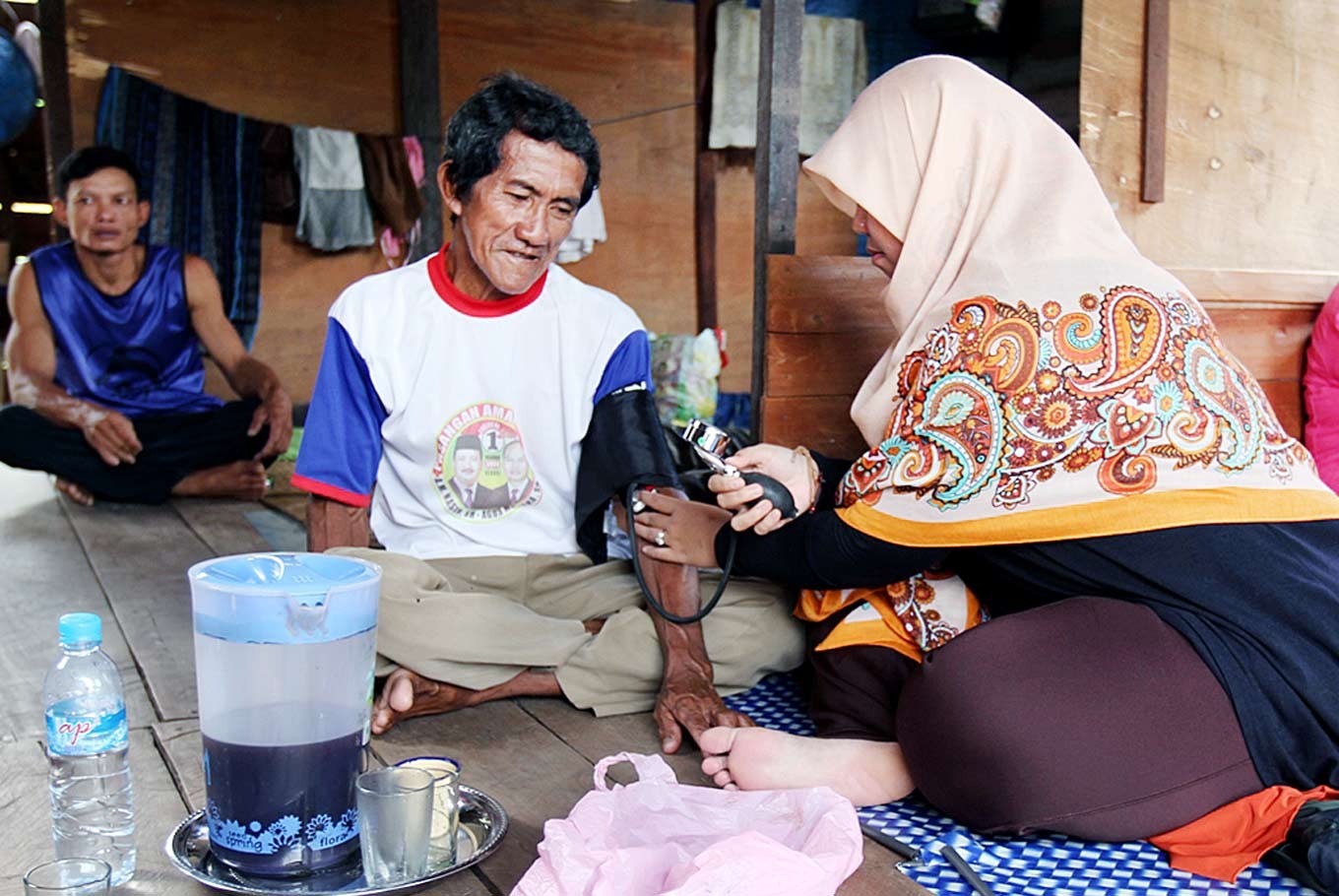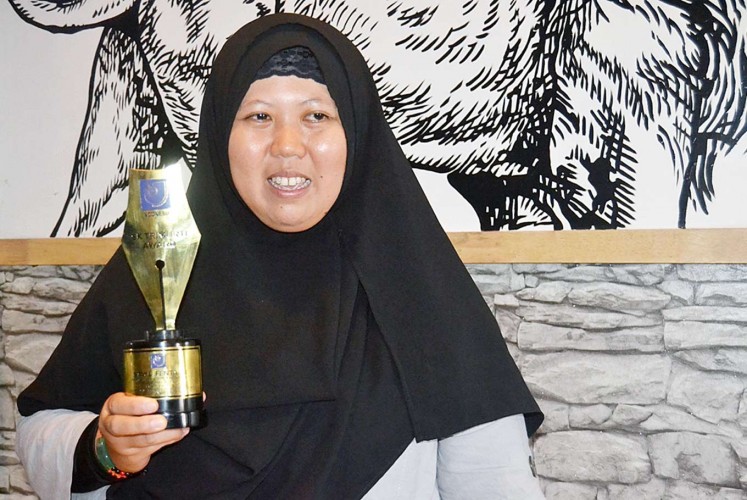Popular Reads
Top Results
Can't find what you're looking for?
View all search resultsPopular Reads
Top Results
Can't find what you're looking for?
View all search resultsMayu Fentami: Literacy nurse of West Kalimantan
A civil servant working as a nurse in a remote district of West Kalimantan does more than just care for the sick.
Change text size
Gift Premium Articles
to Anyone
T
hirty-year-old nurse Mayu Fentami also uses her spare time volunteering to support the education of local residents. In her young life, she has already amassed many interesting stories to share from her experience volunteering in remote areas.
One of these was when she met with a minor misfortune while trying to deliver books to children in a faraway village.
The story begins with Mayu carrying about 100 books in her backpack and stepping onto a lanting, a wooden floating pier where boats were moored at the start of her journey. Along with Bunut Hilir district head Muhammad Doroes, she was preparing to visit Teluk Aur village.
The village was accessible by speedboat and is about 12 kilometers from Bunut Hilir. Mayu, weighing almost 100 kilograms with the books and unable to swim, missed her step and fell into the river. She was soaked to the skin and the books, originally meant for the village children, were drenched.
“Fortunately it was the shallow part of the river. I had to dry the books in the sun with the help of the district head,” Mayu told The Jakarta Post with a smile during a recent interview in Pontianak, the West Kalimantan capital.
Mayu had just returned from Jakarta, where she had received the 2017 SK Trimurti Award for her devotion and volunteerism in the remote areas of West Kalimantan.
The award, conferred on the occasion of the 23rd anniversary of the Alliance of Independent Journalists (AJI) on Monday, is named after Surastri Karma Trimurti (1912-2008), the legendary female journalist who was frequently jailed because of her ideals and criticism of the Dutch colonizers.
Mayu Fentami (JP/Severianus Endi)Mayu’s job as a nurse has also taken her to neighboring Kapuas Hulu regency at the eastern tip of West Kalimantan province.
As a member of the Bunut Hilir community health center (puskesmas), Mayu did not expect that her volunteer activity could reach an isolated district village where television broadcasts were difficult to access, let alone the internet.
Read also: Which countries have the best healthcare?
From Pontianak, it takes 18 hours by car to the regency capital of Putussibau, before proceeding by speedboat for 2.5 hours to reach Teluk Aur village. There is no alternative overland route, as the village is located on the Kapuas River and is surrounded by several lakes.
“When I arrived, I was very surprised to find such a far-off village with such minimal facilities,” said Mayu, who graduated with a nursing degree from Muhammadiyah University in Yogyakarta.
In May 2014, she began volunteering in the village, where electricity is supplied for only 12 hours every day, from 5 p.m. to 5 a.m.
A new acquaintance, an activist of the Sura Suta 107 FM community radio studio operating from the regional administration’s dining hall, asked her to join a broadcast.
“I immediately thought about communicating the importance of the early detection of cervical cancer,” said Mayu, who explained that radio was the only public communication channel available to the village.
Two months after regular broadcasts, 175 local women visited Maya’s health center to be examined for cervical cancer. With Mayu’s limited orientation since her arrival, she conducted a five-month observation to identify the village population’s major health issues so she could formulate proper solutions.
Read also: From trash to healthcare in Malang
Mayu discovered that the Teluk Aur villagers still had inadequate awareness of hygiene and education: human waste and garbage were dumped into the river while they had almost no reading habit to speak of.
Raising these issues in future broadcasts, Mayu assumed the roles of an operator, announcer and knowledge resource at the same time.
Beginning at dusk, Mayu’s radio broadcasts reached 11 villages in the district. She noticed that since television broadcasts could be enjoyed only by a small number of people in the district center, radio had become the strategic medium for entertainment and information in Teluk Aur.
After several years, progressive change became apparent in the village, with a drastic decrease in using the river for waste disposal and an increased interest in reading, especially among the children. The village had once opened a library, but the lack of management turned its collection into a muddle. Mayu put restored it to order by contacting her Yogyakarta peers and university network.
Together, they raised funds to rent a stall in the local market and turn it into a community library. The provincial library and individual donors contributed around 1,600 books. Local children became accustomed to reading books at the community library named Rumah KaCa, or Kapuas Reading House, with “KaCa” standing for Kapuas membaca.
When the stall’s one-year lease ended, Mayu had difficulty in extending it, so the books were moved to Sura Suta’s broadcasting studio.
Read also: Indonesian doctors struggle with costly equipments
Children have been coming to read books from nearby villages, but access is still limited for those in remote settlements. Mayu solved this by traveling on foot or by bicycle, her backpack and handbag filled with about 100 titles, to five other settlements with several volunteers.
During her visits, children call her “ibu yang bawa buku” (the woman who brings books), indicating their increased interest in reading. With the closure of the rented stall, local children often come knocking on the door of her residence near the health center. They come not only to read books, but also to be taught to play games and tell stories.
“My routine duty is to provide nursing care to outpatients and tend to the intensive care unit. Outside this job, I spend the rest of my time serving the village people,” said Mayu.
In visiting different settlements along the river, Mayu does not hesitate to collaborate with government institutions or the World Wide Fund for Nature (WWF), which run programs in the area.
West Kalimantan WWF senior activist Jimmy Syahirsyah said the activities of Mayu and her peers were congruent with the mission of environmental conservation, so they were able to collaborate in several activities.
Mayu became known as a local champion who inspired others.
The secretary of AJI’s Pontianak chapter, Edho Sinaga, nominated Mayu as a candidate for the SK Trimurti Award. Her name was among those of 17 other women named by various agencies. The jury comprised National Commission on Violence Against Women (Komnas Perempuan) chairperson Azriana, Migrant Care executive director Wahyu Susilo and AJI Indonesia’s Endah Lismartini. Each candidate was appraised according to the criteria of continuity, issues management, remoteness and accessibility of operational location, duration of activity and a minimum three-year operation.
In the end, they decided to grant the award to Mayu.
“I’m not alone in carrying out this activity, many circles are involved. I also share this award with all of them,” said Mayu.












